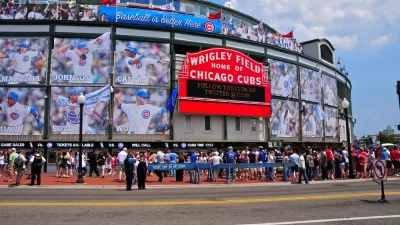The results of a parking pilot project are in.

Boston officials have analyzed the results of a yearlong pilot project to test new schemes for pricing of parking in areas around the Back and Bay and Seaport District.
"City officials announced [last week] that the pilot program, which began on Jan. 3, 2017, showed increases in available metered parking spaces in both areas, as well as decreases in double-parked vehicles and resident-only parking violations," reports Lisa Creamer.
According to Creamer, the pilot project deployed two separate models for parking prices. "On some often-congested arteries in the Back Bay, officials upped the price of metered parking by $2.50 to $3.75 per hour," explains Creamer. "In the Seaport District, the city used what's called 'dynamic pricing,' using sensors in meters to determine the cost of metered parking rates based on the availability of spaces."
The city faced criticism from Mayor Martin J. Walsh in September, when he argued that the program hadn't helped congestion as much as hoped.
Still, the results show a change in parking availability: "Boston saw an 11 percent increase in open metered spots in the Back Bay, while the Seaport saw a modest 1 percent increase in available spaces," according to the analysis released last week.
FULL STORY: Increase In Metered Parking Costs Led To More Spaces, Say Boston Officials

Maui's Vacation Rental Debate Turns Ugly
Verbal attacks, misinformation campaigns and fistfights plague a high-stakes debate to convert thousands of vacation rentals into long-term housing.

Planetizen Federal Action Tracker
A weekly monitor of how Trump’s orders and actions are impacting planners and planning in America.

In Urban Planning, AI Prompting Could be the New Design Thinking
Creativity has long been key to great urban design. What if we see AI as our new creative partner?

King County Supportive Housing Program Offers Hope for Unhoused Residents
The county is taking a ‘Housing First’ approach that prioritizes getting people into housing, then offering wraparound supportive services.

Researchers Use AI to Get Clearer Picture of US Housing
Analysts are using artificial intelligence to supercharge their research by allowing them to comb through data faster. Though these AI tools can be error prone, they save time and housing researchers are optimistic about the future.

Making Shared Micromobility More Inclusive
Cities and shared mobility system operators can do more to include people with disabilities in planning and operations, per a new report.
Urban Design for Planners 1: Software Tools
This six-course series explores essential urban design concepts using open source software and equips planners with the tools they need to participate fully in the urban design process.
Planning for Universal Design
Learn the tools for implementing Universal Design in planning regulations.
planning NEXT
Appalachian Highlands Housing Partners
Mpact (founded as Rail~Volution)
City of Camden Redevelopment Agency
City of Astoria
City of Portland
City of Laramie





























